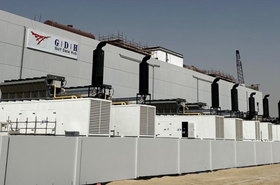China's Tencent Cloud has launched its first cloud region in the Middle East.
Located in Saudi Arabia, the cloud region has two availability zones and will be operational this year.
The launch of the region was announced yesterday, February 10, at the Saudi Ministry of Communications and Technology LEAP 2025 technology summit. Tencent will also invest more than $150 million in Saudi Arabia over the next few years.
The region will offer Tencent's full redundancy, along with advanced cloud services, and artificial intelligence (AI) offerings.
Dan Hu, VP of Tencent Cloud International for the MENA region said: "We’re excited to have grown alongside the Kingdom of Saudi Arabia, and look forward to ramping up cloud support for the Kingdom and the Middle East more broadly. The new cloud Region strengthens our ability to support the country’s digital transformation journey across important regional verticals, including digital media and streaming, video gaming, esports, e-commerce, tourism, financial services, telecommunications, and more."
Mohammed Al Robayan, Deputy Minister of Technology at the Ministry of Communications and Information Technology, added: "This new cloud region will enhance the Kingdom's digital infrastructure and accelerate the adoption of advanced technologies. It also reflects confidence in Saudi Arabia's ambition to become a global hub for digital solutions and smart technology, fostering an economy driven by innovation and knowledge."
Reports that Tencent was looking to expand in Saudi Arabia emerged in March 2024. At the time, the company said it would be making "huge new investments" in data storage.
The new region joins Tencent's network of 21 global regions with more than 50 availability zones. While the company's presence is primarily in Asia, it also has regions in North America (Silicon Valley, Virginia, Toronto), Europe (Frankfurt), and South America (São Paulo).
The Saudi Arabia region marks the company's first in the Middle East.
China's Alibaba Cloud partnered with Saudi Telecom Company in 2023 to launch its cloud offering along with $238 million in investment in infrastructure.
China and the Middle East have a diplomatic relationship, with Saudi Arabia specifically considered a "comprehensive strategic partner" along with Algeria, Egypt, Iran, and the United Arab Emirates, which is China's highest designation of diplomatic relationship, though China has a long-standing non-alliance policy which also extends to the Middle East.
These close ties have previously led to the previous Biden Administration banning some exports of Nvidia and AMD GPUs to the Middle East, and weighing up sales caps in October 2024 to certain countries, with the UAE and Saudi Arabia considered likely to be included.
In January 2025, Biden moved ahead with its AI Diffusion legislation, which limited countries to purchasing up to 1,700 advanced AI chips without permission, with anything more than that requiring a special license. No Middle Eastern countries were included in the "allies and partners" list that exempted them from those rules.
Regardless, US cloud companies have still seen an advantage in developing in the Middle East, all of which offer access to large numbers of advanced AI chips.
Google launched a cloud region in Saudi Arabia in November 2023, located in Dammam, while Oracle launched a second region in the country in August 2024. Amazon Web Services and Microsoft are both currently developing cloud regions in Saudi Arabia, with launches scheduled for 2026.







